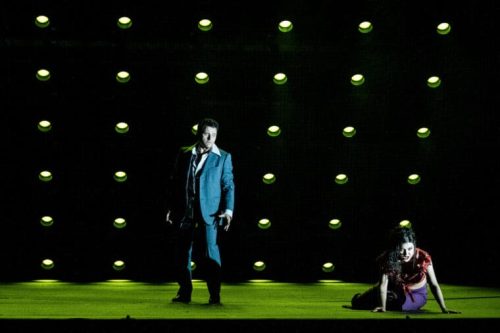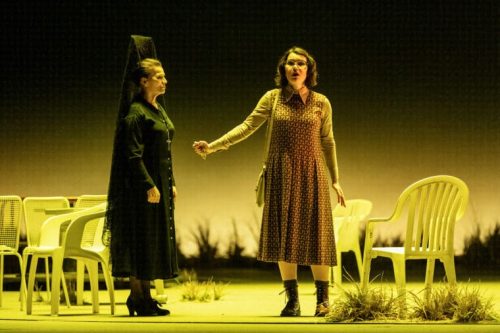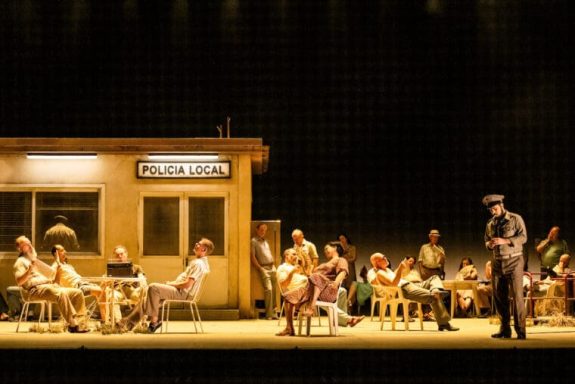 United Kingdom Bizet, Carmen: Soloists, Chorus and Orchestra of the Royal Opera House / Antonello Manacorda (conductor). Royal Opera House, London, 5.4.2024. (CC)
United Kingdom Bizet, Carmen: Soloists, Chorus and Orchestra of the Royal Opera House / Antonello Manacorda (conductor). Royal Opera House, London, 5.4.2024. (CC)

Production:
Director – Damiano Michieletto
Set designer – Paolo Fantin
Costume designer – Carla Teti
Lighting designer – Alessandro Carletti
Dramaturg – Elisa Zaninotto
Chorus director – William Spaulding
Cast:
Moralès – Grisha Martirosyan
Micaëla – Olga Kulchynska
Don José – Piotr Beczała
Zuniga – Blaise Malaba
Carmen – Aigul Akhmetshina
Frasquita – Sarah Dufresne
Mercédès – Gabrielė Kupšytė
Escamillo – Kostas Smoriginas
Dancaïro – Pierre Doyen
Remendado – Vincent Ordonneau
Bohemian – Dawid Kimberg
Orange seller – Louise Armit
Mother of Don José (Voiceover) – Caroline Lena Olsson
The Singing Children – members of the Youth Opera Company
After Barrie Kosky’s production, previously seen at Covent Garden (my review here) split the critics, Damiano Michieletto’s production might be seen as something of a corrective. It locates Carmen in a time and place a long way from the world of Kosky’s Cabaret; here, we are in the scorching heat of Spain, a place in-between cities, dry and hot. References are made to the Wild West, including a troupe of brightly-clad children who parade in front of the curtain at the beginning of each act to reveal the setting for the next part of the action on placards, one letter each. It is delightful the first time, but perhaps less so thereafter, and rather detracts from Bizet’s music underneath.
The biggest digression from the original is the addition of a silent character: Don José’s mother, who quite literally haunts the set from the very beginning (where she shows a card to the audience – unless one is close-up, though, it would be impossible to see that it is the ‘Death’ card which indeed turns up in the opera’s action. It works – kind of, and for a short time – on first acquaintance, but (again) on repetition the novelty will bleed out. There is, incidentally, another ‘extra’ character, a tailor (a caricature of a tailor, at that) for Don Escamillo.
Another ‘clever’ aspect that might well also jar on repetition is the need for a ‘revolve’. The stage is basically a building – which can turn to show both outside and shenanigans within – and a much wider stage space. This idea threads the opera together, in a sense, throughout the various locations of police station, nightclub, warehouse, and dressing room, but I wonder how much Carmen needs threading. Its popularity is entirely justified as it is one of the truly great operas (even if far too many highlights’ discs have blunted the originality of its totality). It can stand perfectly well on its own two feet without directorial dissonance.
The overall feel of this Carmen is that it has been translated into an explicitly verismo setting, a transplanting of France into Italy, but stated as Spain. That idea does not sit too well; the lighting, though (Alessandro Carletti) is striking and responsive to the action, often changing the emotional feel of a scene suddenly (and congruently with the music).
But perhaps the best thing is to dispense with staging? Conductor Aziz Shokhakimov offered the most musically satisfying Carmen I have heard, actually in concert performance in Strasbourg a year shy of one day ago (review here) and due to Shokhakimov, Carmen emerged as the masterpiece it is.
The cast was headed by the Carmen du jour, Aigul Akhmetshina (who shares the run with Vasilisa Berzhanskaya). And not even thirty yet, Akhmetshina dominates the role globally for a reason: her voice has the full range, smoky, chesty and powerful below, shining and beautifully projected up top. Her ‘L’amour est un oiseau rebelle’ set the stall for an evening of vocal perfection. Akhmetshina set not one foot wrong, either literally on stage or metaphorically vocally. She lives every moment, her stage popularity eminently believable.
Connection between her and her Don José, Piotr Beczała (who shares the role with Brandon Jovanovich) was less convincing, however, at least dramatically. Vocally he seemed to warm into the evening, offering us later just what his fully blossomed voice can do, but dramatically in a different, and lower, league than his Carmen; his Flower Song (‘La fleur que tu m’avais jetée’) came across as rather stilted.

Here, Micaëla is depicted as a glasses-wearing geek, in maximal contrast to the free-wheeling Carmen. Don José’s mother appears around her, also, and her dramatic importance is therefore somewhat elevated. And Olga Kulchynska is a perfect choice: Micaëla’s aria, ‘Je dis que rien m’épouvante’, was, musically, simply delicious, the epitome of the spirit of French opéra.
A number of singers who have impressed many times before courtesy of the Jette Parker Artists scheme impressed again: Blaise Malabala was a strong Zuniga, while Sarah Dufresne and Gabrielė Kupšytė were a superbly matched Frasquita and Mercédès respectively. Fair to say I have only once heard a finer Frasquita live previously: Florie Valiquette in that Strasbourg performance.
While I enjoyed Kostas Smoriginas as Donner in the recent Das Rheingold at Covent Garden, his Escamillo was somewhat surprisingly reticent in the Toreador’s Song (surprising given the enthusiasm and confidence he displayed with his hammer at his big moment in the Wagner). All of the smaller roles were well taken, it is true (including two native French singers in the Remendado of Vincent Ordonneau and the Dancaïro of Pierre Doyen); it is just that the whole did not quite add up, vocally (a near-miss, though) and dramatically (something more of a fail).
Conductor Antonello Manacorda began well, with some nice highlighting of detail at the opening, but there were too many loose ends, not least the high strings just before Carmen enters for the first time. All in all, not Covent Garden’s greatest achievement, although Michieletto’s production might well stand the test of time more than Kosky’s.
Colin Clarke
Featured Image: Damiano Michieletto’s production of Carmen © Camilla Greenwell
